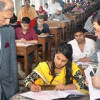The overwhelming pressures of a public university aspirant

I remember my mother telling me, quite matter-of-factly, that if I did not get into a public university, private university would not be a viable alternative. I took it with a grain of salt, hit the books, and lucked out with a public university acceptance. My mother could finally exhale when I did, but I remember the constant and paralysing anxiety that held firmly through the entire process.
The mantra, "to make it in life, you have to ensure a spot at a public university," is one that most people grow up having ingrained in them. The groundwork is laid throughout one's childhood, every move proves to be a litmus test to see if you are worthy. Whether it's for engineering, medical or business studies, one must constantly work to pursue that coveted spot. Ever heard the classic, "How will you get into a public university by scoring a seven out of ten?"
Every year thousands of students apply for limited seats in less than 60 public universities and only a very small percentage get in. Public universities appeal to students and parents because of their economic viability, quality education, reputation, job opportunities, and history. An antiquated notion persists that students from public institutions are more likely to get secure careers as opposed to students from private universities. Additionally, their prospects of becoming Bangladesh Civil Service (BCS) cadres tend to be higher.
The aspirants already are under immense pressure due to their own expectations and never-ending coaching classes, but the monetary concern, as well as family expectations, add additional pressure on students.
Nusrat Fatema Syed, a public university aspirant (Dhaka University C unit) says, "I feel pressured to get into a public university. Since I belong to a middle-class family, the pressure is created automatically. The huge amount of funds a renowned private university requires nowadays is maybe possible to provide by my family but it's definitely not easy to do so. Besides that, it'll make my family proud which is very important to me." Nusrat also pointed out peer pressure to be one of the many reasons why she wants to get into a public university.
For numerous aspiring public university students, getting admission to a public university represents a crucial milestone in their pursuit of higher education. The economic nature of public universities plays a pivotal role in making the expenses associated with higher education more manageable, facilitating financial savings for students.
Jawjaw Thaoi Marma, another public university aspirant (Dhaka University A unit), mostly speaks of the academic pressure, "This year the pressure feels too intense. The university exams used to take place with significant breaks but this year the tests will finish in one month. The huge competition along with the vast syllabus is overwhelming."
Many students, like Jawjaw, adopt a strategic approach by applying to multiple units, each encompassing distinct syllabuses, as a precautionary measure. Consequently, these students find themselves preparing for vastly different academic scenarios, just to ensure they get into any public university.
Students are prone to cramming consistently because of the tests held in coaching centres. The results are often shared with the parents and hence. they must try their best.
"Students frequently immerse themselves in intensive study routines, unknowingly disregarding their health and become ill during this stressful time. Overexertion carries considerable hazards, especially for students who frequently report insomnia and anxiety. Such persistent stress can weaken the immune system, making people prone to various illnesses. Those facing these issues are recommended to consult their physician or seek counselling services for support and overall well-being," says Dr Noor Ahmed Giasuddin, Associate Professor, Psychiatry Department, Dhaka Medical College.
Giasuddin also urges parents to be more understanding of their children's situations and be more empathetic. Parents can strengthen their bonds with their children by cultivating empathy, which promotes emotional well-being and creates an environment conducive to open communication and understanding.
He says further, "Parents have to guide their children towards pursuing goals aligned with their strengths and confidence. While public universities may appear attractive, it is essential to recognise that numerous lucrative professions are gaining prominence these days."
Public university aspirants find themselves in a pressure cooker, making it tough to sit without a whirlwind of thoughts. The outcome might not truly reflect the applicant's academic abilities. Tackling this challenge is no walk in the park for parents and guardians. They need to step into their child's shoes, grasp the stress, and combat the looming feeling of inadequacy. The environment these students live in often amplifies these struggles. It's paramount to create a secure and supportive atmosphere to ease the burden.
Azra Humayra is majoring in Mass Communication and Journalism at the University of Dhaka.

 For all latest news, follow The Daily Star's Google News channel.
For all latest news, follow The Daily Star's Google News channel. 








Comments